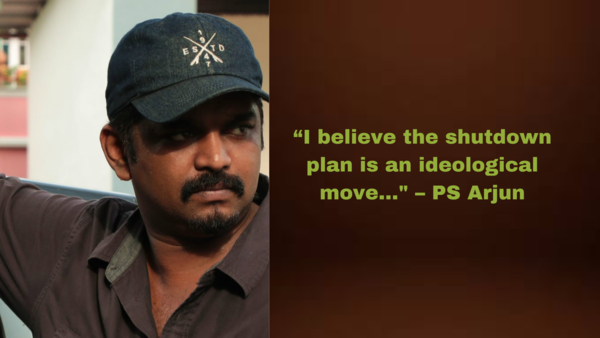The Malayalam film industry is on the verge of a complete shutdown starting June 1, as financial struggles continue to plague producers, distributors, and exhibitors. Film producer G Suresh Kumar announced this decision on February 6 following a joint meeting of industry associations, including the Film Employees Federation of Kerala (FEFKA).
According to Suresh Kumar, the financial distress has reached alarming levels. He stated that out of 200 films released last year, only 24 were successful. The producers of the remaining films suffered losses amounting to Rs 600 to Rs 700 crore.
Industry representatives blame the financial crisis on soaring production costs, particularly the high remuneration of actors and technicians. They also highlight the burden of government-imposed entertainment taxes, which, along with GST, take up 30% of a film’s gross earnings. They argue that these factors are making it increasingly difficult for Malayalam cinema to sustain itself.
According to Suresh Kumar, previous negotiations with actors have been ineffective, as they agreed to terms during meetings but later failed to follow through.
OTT platforms have not been a dependable alternative, as they only acquire successful films and dictate the pricing, limiting opportunities for the industry.
As people were confused about the box office numbers stated by Suresh and the shutdown, producer Antony Perumbavoor slammed the decision through a social media post.
Following his Facebook post, Prithviraj Sukumaran, who is gearing up for the release of L2: Empuraan, supported him, and Mohanlal also shared the post, stating that cinema is more important than anything else. Many speculated that the ongoing debate is a promotional strategy for L2: Empuraan, which is set to hit theatres on March 27, while others suggested a rift between Suresh Kumar and Mohanlal.
Nevertheless, this situation sheds light on how the shutdown from July will impact many industry workers beyond just the stars. It will affect livelihoods across various sectors, from the theatre business to unit workers. Let’s examine how Mollywood’s future could be shaped if film production halts.
“Shutdown is more a threat to reduce star salaries” – Ramesh Bala
Trade analyst Ramesh Bala recently addressed the issue in a conversation with ETimes. “The success ratio is common across industries—whether Bollywood, Malayalam, or Tamil—where 80–90% of films flop and only 10–20% succeed each year. So, it is not a big deal for the Malayalam industry that so many films have failed. Also, inflating box office figures to satisfy a hero’s ego or stardom is quite common across all industries,” Ramesh told ETimes.
He further added, “Usually, shutdowns are more of a threat. As the deadline approaches, some shutdowns will not happen. But if this one does, it will certainly affect the livelihood of workers.”
According to him, the shutdown is merely a tactic to put actors under pressure and force them to reduce their salaries. “Shutdowns are more of a threat to reduce star salaries. So, if stars agree to a pay cut, the shutdown may not happen,” he stated.
He also acknowledged that the ongoing dispute between Suresh Kumar and L2: Empuraan producer Antony Perumbavoor is intensifying.
Ramesh suggested that a temporary industry shutdown could be beneficial, similar to what happened in Tamil cinema, where halting film production allowed pending movies to be released, clearing the backlog. He noted that the industry faces an oversupply issue, and a break in new shoots for three to six months could help streamline film releases.
“Shutting the industry down is not the solution…” – Lata Srinivasan
Meanwhile, film critic Lata Srinivasan shared her views on the matter. “The Producers’ Council in Kerala has threatened to shut down the industry on 1 June if issues are not resolved, particularly regarding actors’ fees. However, another key issue they pointed out is the government’s entertainment taxes. So, it’s a combination of factors, and I don’t think shutting down the industry is the answer,” she told ETimes.
She continued, “The debate over star salaries has been ongoing in the Hindi, Tamil, and Malayalam film industries. Now that Malayalam actors are seeing success across India and no longer cater solely to the Malayalam audience, their market has expanded. For instance, Unni Mukundan’s Marco became one of the biggest Hindi hits of 2024, despite him being relatively unknown outside Kerala. Naturally, as their market grows, stars increase their fees. But producers in Kerala, who are used to making Rs 20 crore films, are now forced to spend ₹100 crores due to rising star remuneration. Entertainment taxes are also adding to the financial burden, which is an issue across all industries.”
Lata emphasised that shutting down the industry is not the solution; rather, an open discussion is necessary. “That’s why they are meeting the Chief Minister to find a resolution,” she added.
She also noted that many industry professionals’ livelihoods are at stake, making a complete shutdown unlikely. “Producers have invested significant amounts, and they too would be affected. When a strike occurred in Kollywood, people simply shifted their shoots to Hyderabad. Malayalam film producers could do the same—take, for example, Prithviraj, who is producing L2: Empuraan; he could easily relocate the shoot, as he is both the star and the producer. So, alternative solutions exist.”
While addressing speculation that the shutdown news is a PR strategy for L2: Empuraan, Lata dismissed the claims, saying, “It has nothing to do with Prithviraj’s film. The producers—Antony Perumbavoor and Prithviraj himself—are insiders. So, the strike will hardly impact them; it’s more about the rest of the industry.”
“I believe the shutdown plan is an ideological move…” – PS Arjun
Filmmaker PS Arjun also weighed in on the matter, asserting that the shutdown plan has nothing to do with the PR of Empuraan.
“Suresh Kumar’s press release did not indicate any connection to that. Personally, I believe the shutdown plan is an ideological move that only affects those working in the film industry. The shutdown does not impact the general public, as we saw during the COVID-19 pandemic—cinema is not an essential commodity for common people. The high entertainment tax issue will be discussed with the government to find a proper resolution,” he shared.

He believes that major industry figures will speak publicly about the issue as the shutdown date approaches.
Regarding the possibility of the industry transitioning completely to OTT, Arjun stated, “Bypassing traditional structures like FEFKA and shifting to direct digital distribution is not feasible for the Malayalam film industry at this point. While it offers financial flexibility—reducing distribution and publicity costs, which typically range from Rs 50 lakh to Rs1 crore per film—most OTT platforms do not buy films without a theatrical release. A strong theatrical presence and effective publicity are essential for securing OTT deals, particularly for films without a major star or established brand name.”
He also pointed out that the business model of OTT platforms remains uncertain, making a full transition impractical. “Most Malayalam film producers are independent and not corporate-backed. They are not interested in revenue-sharing or pay-per-view models on OTT. So, for now, this transition is not feasible,” he explained.
As movie lovers and industry professionals worry about the shutdown, the only viable solution is inclusive discussions involving major stars and the government. Reports suggest that industry associations plan to hold a symbolic strike in front of the Secretariat in Thiruvananthapuram, Kerala.


